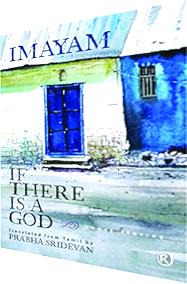 If there is a god
If there is a god
Imayam (Translated from the original Tamil by Prabha Sridevan)
Ratan Books
Rs.499 Pages 224
This book is a collection of ten short stories that capture the lives of ordinary people governed by the larger structures of class, caste and gender
I would have been a loser in not knowing Mr. Imayam,’ stated Adoor Gopalakrishnan, the renowned and critically acclaimed Indian filmmaker, at the book release of Imayam’s If there is a God. Anyone who has read Imayam either in Tamil or in translation would agree with the sentiment expressed by Gopalakrishnan.
Such is the power of the compelling stories Imayam weaves. He has seven novels, one novella and six short story collections to his credit. Imayam is one of the few contemporary Tamil writers whose works are being translated into English. The book under review is a collection of ten short stories that capture the lives of ordinary people governed by the larger structures of class, caste and gender.
The stories in the collection effectively delineate the pervasiveness of caste and gender politics in Indian society, particularly in rural areas. Imayam focuses on everyday casteist and sexist tendencies that the common man is susceptible to, instead of its institutionalised forms. The stories are a study on the influence and workings of caste and gender at varying degrees in various aspects of people’s lives.
The first story ‘Over in a Moment’ offers a peek into the life of a middle-aged couple. The wife, Kamatchi, feels her life has “everything but salt” as she has an unsatisfactory sex life. All acts of intimacy between them have always been initiated by the husband while she is at a loss as to how to articulate her own desire. This story corresponds to the larger context of patriarchal conditioning where women are by convention denied the space and vocabulary to express their sexual needs and lead unfulfilled lives within the institution of marriage.
Caste affinity in its most detestable forms is highlighted in two stories: ‘I Swear on My Thali’ and ‘If There is a God’. The former displays how electoral votes are invariably determined by caste, as voters tend to favour candidates belonging to their own caste. It also shows how representation becomes a farce as even in constituencies reserved for lower caste people and women, it is the dominant caste men who wield real authority.
The book title story is a moving account of a bereaved mother, Vasantha, who seeks to imprison the man responsible for her son’s death. She is asked to drop the charges as the perpetrator is from the same caste as her and because she lacks the monetary resources needed for the legal proceedings. At first, she indignantly responds, “Every criminal dog tries to escape using his caste. Did he not know my child was from his caste when he was abusing him? Let him try to talk about caste and I will slam him with my winnow.” However, in the end, she is overpowered by her community.
All the ten stories in this collection present raw sketches of lives that are often invisibilized or marginalised in art. Occupying centre stage are homemakers, teachers, office peons, hostel wardens, construction workers and grave diggers. It is their lives in its fullness that is captured. Since most of the stories are from a female perspective, it is women’s voices that are dominant and their characterisation is highly impressive.
The women in these stories resemble individuals we see in our everyday life, women who are able to pick themselves up no matter what life throws at them and exhibit courage in most unexpected ways.
Vasantha refuses to touch the compensation money offered and walks away while Santha is forthright in putting an end to her employer’s unwanted advances. Valliammai is practical, decisive and unafraid to override her husband’s illogical wish. Sita and Nagamani are resilient and a friendship buds between them in the unlikeliest of places, a graveyard. Imayam’s writings are forceful enough for us to consider the proposition that male writers are inept at drawing women characters and can’t fully do them justice.
Imayam’s wariness of being labelled a ‘Dalit writer’ is reflected in his writing, as the characters he constructs are not confined and restricted to their caste and gender identity. There aren’t any stories that pit two castes or genders against each other, where one caste or gender is villainised while the other is shown as victimised. The stories are presented with such complexity that readers are forced to set aside their presentations and understand the characters. For example, none of the male protagonists is vilified in any of the stories.
The honesty and earnestness with which Imayam narrates these stories are remarkable. They are not instruction manuals on social justice, and his characters don’t parrot political rhetoric. The day-to-day lives of people that Imayam presents to his readers are political, yet, the treatment of the characters is marked with an empathy that is truly befitting an artist.
A. Aazhi Arasi (The Book Review)



























